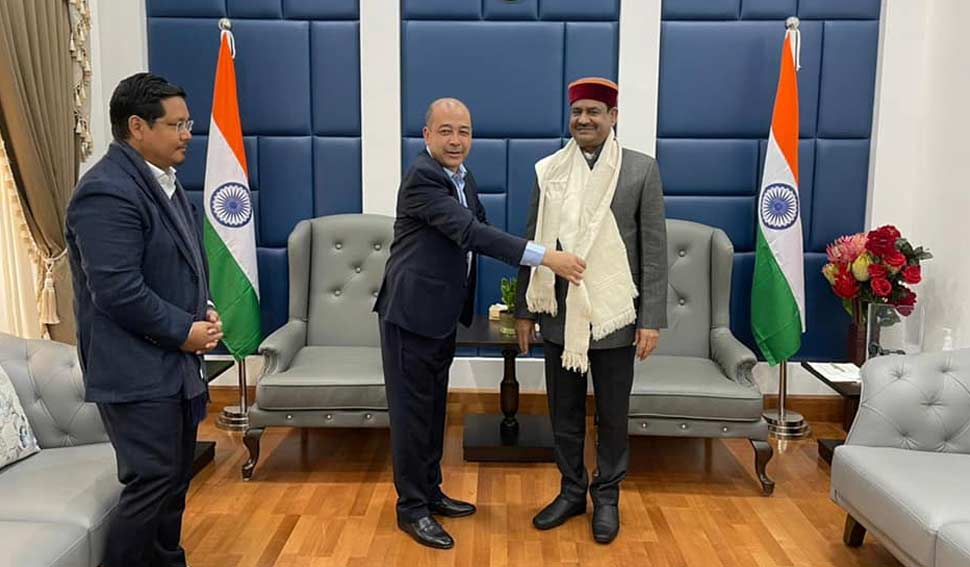Lok Sabha Speaker to address MLAs tomorrow
Lok Sabha Speaker Om Birla will visit the state capital on February 25-26. This was consequent to the invite of the Chief Minister, Conrad K Sangma and Speaker of the Meghalaya Legislative Assembly, Metbah Lyngdoh.
The Lok Sabha Speaker will address Members of the Meghalaya Legislative Assembly at the Meghalaya Legislative Assembly Building, Rilbong following which he will visit the construction site of the New Meghalaya Legislative Assembly Building at Mawdiangdiang.
On the following day of his visit, the Lok Sabha Speaker will inaugurate the Outreach and Familiarization Programme for Local Bodies of the State of Meghalaya and other North Eastern States scheduled to be held at the State Convention Centre, Pinewood Hotel, Shillong.
Initiated by the Lok Sabha Speaker, this first of its kind programme is being organized by the Parliamentary Research and Training Institute for Democracies (PRIDE), Lok Sabha Secretariat and the programme focuses on enhancing participatory democracy through a greater awareness of the procedures and processes followed by democratic institutions functioning at various levels right from the grassroots to the apex level. The programme is intended to strengthen the institutions of governance and planning at the grass-root level, since maximizing self-governance is critical to empowering people. Apart from Panchayati Raj System, there is a need for mobilizing and strengthening Traditional Grass Root level Institutions as present in the Fifth and Sixth Schedule States.
The first such Outreach Programme was organized at Dehradun, Uttarakhand on January 8, 2021 with full cooperation and support of the State Government. The Programme was attended by 445 Panchayat Representatives including 13 Zila Panchayat Chairmen and 12 Deputy Chairmen, 125 Zila Panchayat Members along with 85 Block Panchayat Pramukh and 210 Gram Pradhans of Uttarakhand who physically attended the above mentioned programme. In addition, approximately 40,000 Panchayat Representatives and officials were also connected to the programme online via weblink.
The second edition of the Outreach programme, carrying the theme ‘Panchayati Raj System/Autonomous District Councils: Strengthening the Decentralized Democracy’ is being organized for the Grass Root level Institutions of the State of Meghalaya and other North Eastern States on February 26, 2021 at the State Convention Centre, Shillong. Around 90 Members of Autonomous District Councils of Meghalaya will be physically attending the above mentioned programme.
In addition, 80 representatives from the local self government bodies of other North Eastern States including 25 Zila Parishad Chairmen from Arunachal Pradesh, 26 Zila Parishad Chairmen from Assam, 6 Zila Parishad Chairmen from Manipur, 6 MDCs from Mizoram, nominated 5 heads of Village Councils from Nagaland, 4 Zila Parishad Chairmen from Sikkim and 8 Zila Parishad Chairmen from Tripura will also be physically present for the programme. Apart from this, remaining Panchayat Representatives from all of the North Eastern States will be connected to the programme online via weblink.
The fundamental aims and objectives of the programme include creation of mass awareness and mass participation, creation of self confidence and self respect for the ground level leaders, creation of sense of ownership of the assets that have been created, fuelling the ambitions for grass root political leaders for democratic values, creation of awareness about the various schemes and providing an opportunity to develop a network and push the aspirational level of the ground level leadership.
On account of the distinct customs and traditions prevailing in the North Eastern Region, the Panchayati Raj institutions set up to provide local self-governance machinery to the rural population of the Country through the 73rd Constitutional Amendment was apprehended that it may come into conflict with the traditional systems present in the Tribal regions of the North Eastern States. To address this and to safeguard the democratic traditions and cultural diversity of the region and based on the recommendations of a Sub-Committee formed under the leadership of Gopinath Bordoloi, the Sixth Schedule was conceived in the Constitution. The effort was made to accommodate the collective aspirations of tribal communities within the broader framework of a democratic political system.
It may be mentioned that a large part of North-East India is governed by the Fifth and Sixth Schedules of the Indian Constitution. Three states, namely, Meghalaya, Mizoram, and Nagaland are exempted from the purview of the 73rd Amendment and come under the Sixth Schedule of the Constitution. The Panchayats (Extension to the Schedule Areas) Act, 1996 extends the 73rd Amendment to the Fifth Schedule areas. The non-Sixth Schedule States in the North-East where 73rd and 74th Amendments (Panchayati Raj Institutions) have been implemented are Assam (barring Karbi Anglong Autonomous District Council and North Cachar Hills Autonomous District Council), Manipur, Tripura (barring Tripura Tribal Areas Autonomous District Council), Arunachal Pradesh and Sikkim.
The Outreach and Familiarization Programme will feature Panel Discussions on topics including Indian parliament and Grass Root level Institutions, Leadership of Local Bodies for the Tribal Welfare in the North Eastern States & Natural Resources of the North Eastern States and the Role of Local and Traditional Bodies in its preservation and conservation.

Leave a Reply